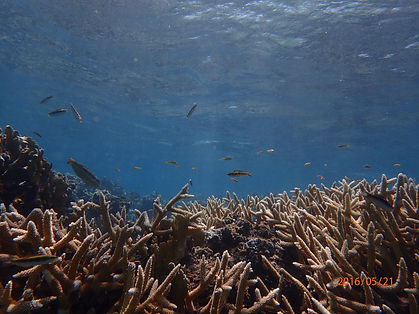"Please visit and enjoy my natural ecosystems with respect and care."

If you want to visit any of the marine protected areas of Puerto Rico and learn about its marine ecosystems, you are not the only one.
Every year, thousands of people visit and explore the wonders and natural landscapes of Puerto Rico's marine protected areas. These submerged spaces are characterized by beautiful coral reefs and a great biodiversity of marine organisms.
However, the increase in interest and growing recreational use has the potential to increase possible negative impacts on marine ecosystems, especially if the visitor does not know the best practices when diving into the reef or seagrasses. They are fragile ecosystems that are in the process of recovery after the impact of the 2017 hurricane season.
Therefore, it is crucial that we know the label that we must assume when visiting these spaces, which are home to a great diversity of marine organisms; many that are currently in danger of extinction.
Knowing how to interact with marine wildlife beforehand will help you make the right decisions when swimming alongside other marine organisms in your habitat.
To minimize our impact on the reef, and to ensure a responsible and safe encounter with the wildlife it harbors, optimize the recreational experience. It is important that we commit to the following standards:
Before entering the water and visiting these sensitive spaces, remember ...








Remember,
1) Before visiting marine protected areas, learn about it, its cultural and ecological value, and the authorized tour operators to visit them through a guided excursion. This way, you will get more out of your experience.
2) When you visit the coral reef, keep a distance from it and its organisms. Remember that you are in an extremely valuable place and it is a privilege to be able to visit it.
3) Don't touch or handle marine life. Touching or attempting to touch it can injure the animal, putting its life as well as yours at risk. There are local and federal laws that prohibit direct interaction with wildlife, especially turtles and marine mammals.
4) Do not feed or attract wildlife. Feeding or trying to feed disrupts the animal's normal natural cycles and can cause illness or death if it is fed contaminated or unusual food.
5) Never chase or harass wildlife. Never surround an animal, lock it up or block its escape route; also do not intercept and separate a mother and her calf.
6) Stay away from wildlife that seems abandoned or sick.
7) Promote responsible tour operators and help others learn how to become a responsible visitor. When you see disruptive behavior, educate in a respectful, discreet, and friendly manner. When you are driving a boat, set the example and slow down in areas frequented by marine life, do a responsible anchoring in sand patches, and encourage others to do the same.
8) Enjoy the experience!
Source: NOAA Ocean Etiquette:
http://sanctuaries.noaa.gov/protect/oceanetiquette.html
Marine Wildlife Viewing Guidelines
Guía de Observadores de Vida Salvaje (2004)
La siguiente Guía de observadores de vida silvestre marina busca ayudarle a disfrutar de observar la vida silvestre marina sin causar daño a ésta o poner su seguridad personal en riesgo.
Por favor tenga en cuenta que esta es una guía general, y que los tipos de vida silvestre, condiciones locales de hábitat, y número de personas presentes en el área requerirán restricciones locales para proteger la vida salvaje. Siempre siga las guías locales y específicas de especies y las regulaciones cuando estén disponibles, y respete los derechos de los propietarios de tierras y de otros observadores de vida salvaje en sus viajes.





